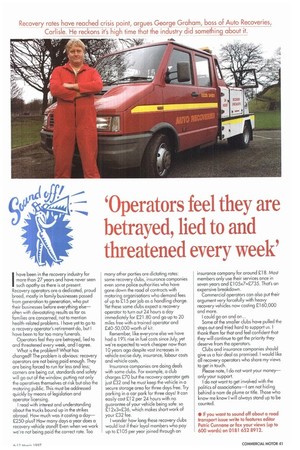'Operators feel they are betrayed, lied to and threatened every week'
Page 43

If you've noticed an error in this article please click here to report it so we can fix it.
Ihave been in the recovery industry for more than 27 years and have never seen such apathy as there is at present. Recovery operators are a dedicated, proud breed, mostly in family businesses passed from generation to generation, who put their businesses before everything else— often with devastating results as far as families are concerned, not to mention health-related problems. I have yet to go to a recovery operator's retirement do, butl have been to far too many funerals.
Operators feel they are betrayed, lied to and threatened every week, and I agree. What is the problem? What has changed? The problem is obvious: recovery operators are not being paid enough. They are being forced to run For less and less; corners are being cut, standards and safety will go out of the window, putting not only the operatives themselves at risk but also the motoring public. This must be addressed quickly by means of legislation and operator licensing. I read with interest and understanding about the trucks bound up in the strikes abroad. How much was it costing a day£250-plus? How many days a year does a recovery vehicle stand? Even when we work we're not being paid the correct rate. Too
many other parties are dictating rates: some recovery clubs, insurance companies even some police authorities who have gone down the road of contracts with motoring organisations who demand fees of up to £15 per job as a handling charge. Yet these same clubs expect a recovery operator to turn out 24 hours a day immediately for £21.80 and go up to 20 miles free with a trained operator and £40-50,000 worth of kit.
Remember, like everyone else we have had a 19% rise in fuel costs since July, yet we're expected to work cheaper now than 10 years ago despite vast increases in vehicle excise duty, insurance, labour costs and vehicle costs.
Insurance companies are doing deals with some clubs. For example, a club charges £70 but the recovery operator gets just £32 and he must keep the vehicle in a secure storage area for three days free. Try parking in a car park for three days! It can easily cost £12 per 24 hours with no guarantee of your vehicle being safe: so £12x3=£36, which makes short work of your £32 fee. I wonder how long these recovery clubs would last if their loyal members who pay up to £105 per year joined through an insurance company for around £18. Most members only use their services once in seven years and £105x7=£735. That's an expensive breakdown. Commercial operators can also put their argument very forcefully with heavy recovery vehicles now costing £.160,000 and more.
I could go on and on... Some of the smaller clubs have pulled the stops out and tried hard to support us. I thank them for that and feel confident that they will continue to get the priority they deserve from the operators. Clubs and insurance companies should give us a fair deal as promised.lwould like all recovery operators who share my views to get in touch. Please note, I do not want your money— only your support.
Ido not want to get involved with the politics of associations—lam not hiding behind a nom de plume or title. Those who know me know I will always stand up to be counted.
• If you want to sound off about a road transport issue write to features editor Patric Cunnane or fax your views (up to 600 words) on 0181 652 8912.
































































































